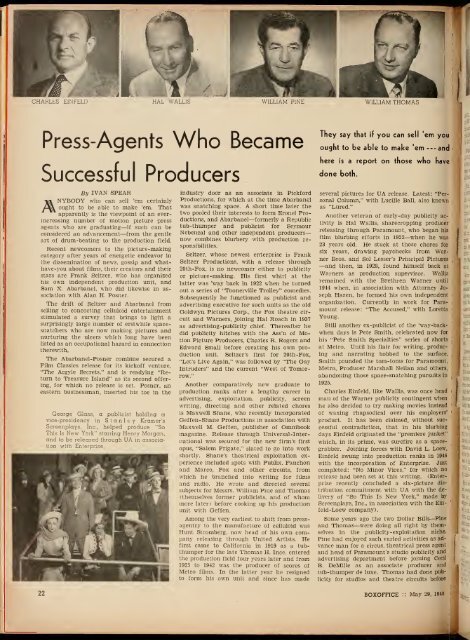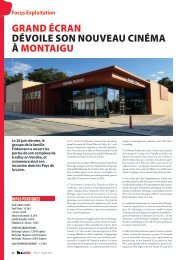Create successful ePaper yourself
Turn your PDF publications into a flip-book with our unique Google optimized e-Paper software.
'<br />
—<br />
CHAKLhS EINFELD HAL 'vVALLIS WILLIAM PINE WILLIAM THOMAS<br />
Press-Agents Who Became<br />
Successful Producers<br />
By IVAN SPEAR<br />
^ NYBODY who can sell 'em certainly<br />
/40k ought to be able to make 'em. That<br />
apparently is the viewpoint of an everincreasing<br />
number of motion picture press<br />
agents who are graduating— if such can be<br />
considered an advancement—from the gentle<br />
art of drum-beating to the production field.<br />
Recent newcomers to the picture-making<br />
category after years of energetic endeavor in<br />
the dissemination of news, gossip and whathave-you<br />
about films, their creators and their<br />
stars are Frank Seltzer, who has organized<br />
his own independent production unit, and<br />
Sam X. Abarbanel, who did likewise in association<br />
with Alan H. Posner.<br />
The drift of Seltzer and Abarbanel from<br />
selling to concocting celluloid entertainment<br />
stimulated a survey that brings to light a<br />
surprisingly large number of erstwhile spacesnatchers<br />
who are now making pictures and<br />
nurturing the ulcers which long have been<br />
listed as an occupational hazard in comiection<br />
therewith.<br />
The Abarbanel-Posner combine secured a<br />
Film Classics release for its kickoff venture,<br />
"The Argyle Secrets," and is readying "Return<br />
to Treasure Island" as its second offering,<br />
for which no release is set. Posner, an<br />
eastern businessman, inserted his toe in the<br />
George Glass, a publicist holding a<br />
vice-presidency in Stanley Kramer's<br />
Screenplays, Inc., helped produce "So<br />
This Is Nevir York" starring Henry Morgan,<br />
and to be released through UA in association<br />
with Enterprise.<br />
indiistry door as an associate in Pickford<br />
Productions, for which at the time Abarbanel<br />
was snatching space. A short time later the<br />
two pooled their interests to form Eronel Productions,<br />
and Abarbanel—formerly a Republic<br />
tub-thumper and publicist for Seymour<br />
Nebenzal and other independent producers<br />
now combines blurbery with production responsibilities.<br />
Seltzer, whose newest enterprise is Frank<br />
Seltzer Productions, with a release through<br />
20th-Fox, is no newcomer either to publicity<br />
or picture-making. His first whirl at the<br />
latter was 'way back in 1922 when he turned<br />
out a series of "Toonerville Trolley" comedies.<br />
Subsequently he functioned as publicist and<br />
advertising executive for such units as the old<br />
Goldwyn Pictui-es Corp.. the Fox theatre circuit<br />
and Warners, joining Hal Roach in 1937<br />
as advertising-publicity chief. Thereafter he<br />
did publicity hitches with the Ass'n of Motion<br />
Picture Producers, Charles R. Rogers and<br />
Edward Small before creating his own production<br />
unit. Seltzer's first for 20th-Fox,<br />
"Let's Live Again," was followed by "The Gay<br />
Intruders" and the current "West of Tomorrow."<br />
Another comparatively new graduate to<br />
production ranks after a lengthy career in<br />
advertising, exploitation, publicity, screen<br />
writing, directing and other related chores<br />
is Maxwell Shane, who recently incorporated<br />
Geffen-Shane Productions in association with<br />
Maxwell M. Geffen, publisher of Omnibook<br />
magazine. Release through Universal-International<br />
was secured for the new firm's first<br />
opus, "Salem Frigate," slated to go into work<br />
shortly. Shane's theatrical exploitation experience<br />
included spots with Publix. Panchon<br />
and Marco. Fox and other circuits, from<br />
which he branched into writing for films<br />
and radio. He wrote and directed several<br />
subjects for Messrs. William Pine and Thomas<br />
(themselves former publicists, and of whom<br />
more later) before cooking up his production<br />
unit with Geffen.<br />
Among the very earliest to shift from pressagentry<br />
to the manufacture of celluloid was<br />
Hunt Stromberg, now head of his own company<br />
releasing through United Artists. He<br />
first came to California in 1919 as a tubthumper<br />
for the late Thomas H. Ince. entered<br />
the production field four years later and from<br />
1925 to 1942 was the producer of scores of<br />
Metro films. In the latter year he resigned<br />
to form his own unit and since has made<br />
They say that if you can sell 'em you<br />
ought to be able to make 'em ---and<br />
here is a report on those who have<br />
done both.<br />
several pictures for UA release. Latest: "Personal<br />
Column," with Lucille Ball, also known<br />
as "Lured." '<br />
Another veteran of<br />
early-day publicity activity<br />
is Hal Wallis, sharecropping producer<br />
releasing through Paramount, who began his<br />
film blurbmg efforts in 1922—when he was<br />
23 years old. He stuck at those chores for<br />
six years, drawing paychecks from Warner<br />
Bros, and Sol Lesser's Principal Pictures<br />
—and then, in 1928, found himself back at<br />
Warners as production supervisor. Wallis<br />
remained with the Brethren Warner until<br />
1944 when, in association with Attorney Joseph<br />
Hazen, he formed his own independent<br />
organization. Currently in work for Paramount<br />
release: "The Accused," with Loretta<br />
Young.<br />
Still another ex-publicist of the 'way-backwhen<br />
days is Pete Smith, celebrated now for<br />
his "Pete Smith Specialties" series of shorts<br />
at Metro. Until his flair for writing, producing<br />
and narrating bobbed to the surface,<br />
Smith pounded the tom-toms for Paramount,<br />
Metro, Producer Marshall Neilan and others,<br />
abandoning those space-snatching pursuits in<br />
1925.<br />
Charles Einfeld, like Wallis, was once head<br />
man of the Warner publicity contingent when<br />
he also decided to try making movies instead<br />
of waxing rhapsodical over his employers'<br />
product. It has been claimed, without successful<br />
contradiction, that in his blurbing<br />
days Einfeld originated the "premiere junket"<br />
which, in its prime, was sm-efire as a spacegrabber.<br />
Joining forces with David L. Loew,<br />
Einfeld swung into production ranks in 1946<br />
with the incorporation of Enterprise. Just<br />
completed: "No Minor Vices," for which no<br />
release had been set at this wTiting. (Enterprise<br />
recently concluded a .six-picture distribution<br />
commitment with UA with the delivery<br />
of "So This Is New York," made by<br />
Screenplays, Inc., in association with the Einfeld-Loew<br />
company).<br />
Some years ago the two Dollar Bills—Pine<br />
and Thomas^were doing all right by themselves<br />
in the publicity-exploitation niche.<br />
Pine had enjoyed such varied activities as advance<br />
man for a circus, theatrical press agent<br />
and head of Paramount's studio publicity and<br />
advertising department before joining Cecil<br />
B. DeMille as an associate producer and<br />
tub-thumper de luxe. Thomas had done publicity<br />
for studios and theatre circuits before<br />
22 BOXOFFICE :: May 29, 1948<br />
-til

















